Topics:
Never Miss a Beat - Get Updates Direct to Your Inbox
FILTER:


The Pros & Cons: Why Should You invest in an Amazon Business?
By Ian Drogin
As Amazon’s revenue and profits continue to soar, so do the opportunities for those interested in acquiring Amazon businesses.
Over the past several years, we’ve seen the marketplace for Amazon businesses grow steadily with no signs of slowing down. Increased customer demand combined with a proven business model are making many Amazon businesses highly desirable among investors, prompting many FBA sellers to wonder, “should I sell my Amazon business?”
With over 2.5 million sellers and a combined sales volume of 4000 products per minute on average in the U.S., it’s no surprise that Amazon’s annual growth rate has exceeded 37%.
We’ve witnessed a surge in interest for Amazon businesses among potential buyers, as well as an increasing number of sellers curious about exploring exit opportunities. Successful sellers see an opportunity to diversify, while buyers recognize the many strengths that such businesses can offer from an investment standpoint.
In this article, we’ll explore the pros and cons of investing in Amazon businesses, along with what factors are most important to consider in your investment decisions.
Pros of Investing in Amazon Businesses
There are many benefits to investing in Amazon businesses.. Some of the primary advantages include:
- The marketplace has matured, making Amazon businesses a more stable investment.
- Ownership transfer is relatively simple and straightforward.
- Many eCommerce stores have an Amazon component.
- Amazon seller growth is consistent.
- There are numerous tools, resources, and agencies to help Amazon businesses succeed.
- No need to do your own fulfillment
A maturing Amazon business marketplace
Although the Amazon marketplace started in 2006, it really increased in traction and widespread adoption from 2012 onwards.
This means that many sellers who got started in 2012 and 2013 have now been in business for seven or eight years. Even those who didn’t start until 2017 still have a solid three years under their belt.
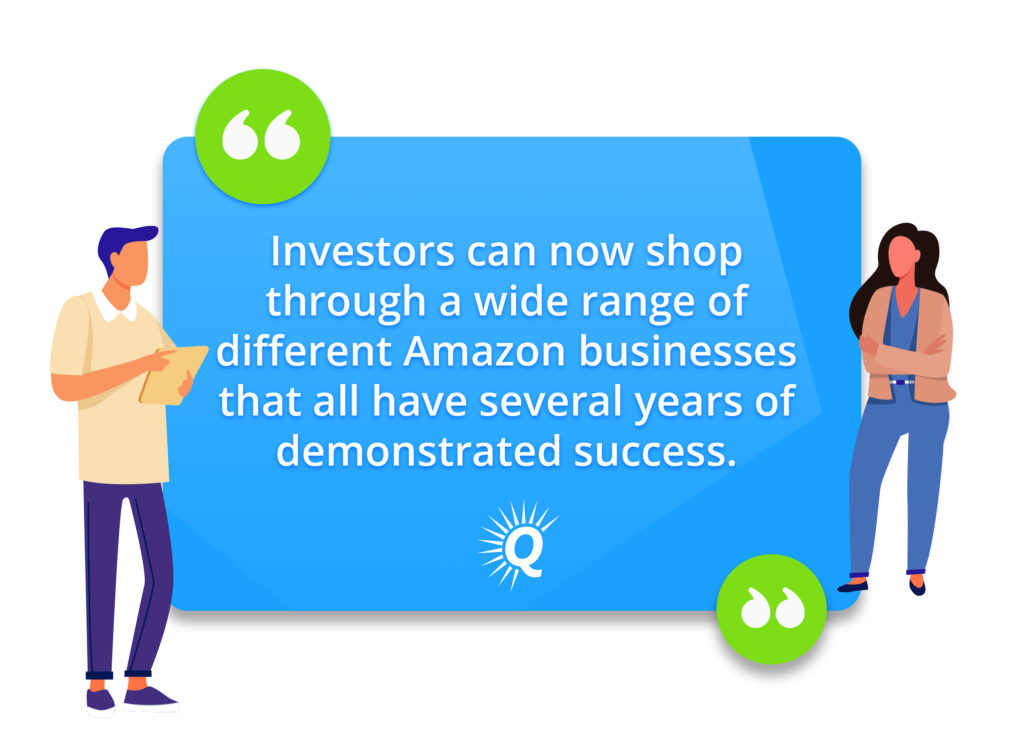

This marketplace maturation timeline ensures that there are many Amazon businesses out there that have a proven track record with consistent growth in the Amazon marketplace. Of course, this translates into desirable business acquisition opportunities for potential buyers.
Since on average there is a positive correlation between the stability of an FBA business and the length of time it’s been operating, the availability of viable Amazon businesses for sale has been steadily increasing. Instead of needing to take significant risks on early-stage ventures, investors can now shop through a wide range of different Amazon businesses that all have several years of demonstrated success.
Convenient ownership transfer process
During the earlier stages of Amazon business ownership transfers, there was widespread uncertainty and doubt about the legitimacy of passing an FBA business from one owner to the next.
While Amazon still reserves the right to suspend sellers who violate its policies, there are now clear procedures in place for transferring seller accounts from one owner to another.
We always encourage our FBA business sellers to be honest and seek permission from Amazon during the transfer of ownership process. If Amazon gives their stamp of approval, buyers and sellers can both breathe a little easier and feel more comfortable throughout the transfer process. It’s best to speak with a qualified advisor to learn about the exact steps you should take to ensure that your Amazon transaction takes place in a legitimate manner.


Once buyers and sellers overcome any confusion regarding Amazon’s ownership transfer policies, the rest is pretty clear and straightforward. Unlike some other kinds of online businesses, well documented Amazon businesses pose few if any challenges during the ownership transfer process. There are no personal identities attached to an FBA business (unlike a blog) and Amazon’s easy-to-use seller account features ensure that technical confusion is kept to a minimum.
Amazon businesses can easily blend with other eCommerce business models
Now that Amazon businesses have been around for quite some time, most other eCommerce platforms can easily integrate with Seller Central. This allows sellers to sell on their own business websites and fulfill orders through the same FBA fulfillment system that powers the Amazon platform.
Not only does Amazon FBA offer competitive fulfillment rates, but it also makes it extremely simple to manage inventory that is sold on several different platforms. Instead of having multiple warehouses and logistics systems, a seller can manage all inventory through Seller Central in the same way that an Amazon listing is managed.


Amazon’s easy e-commerce integration adds convenience as well as growth opportunities. For buyers who already have an eCommerce store, they can leverage an existing Amazon business to grow their e-commerce business and vice versa.
Amazon sellers are experiencing consistent growth
With Amazon’s year-over-year revenue growth reaching nearly 40%, the opportunities for sellers on the marketplace are enormous.
Over the past few years, even if an FBA business’s market share hasn’t increased, its revenue most likely has. This is due to the consistent and significant growth of the Amazon platform as a whole.
More and more customers are making their way over to Amazon, partly due to the appeal and success of the Amazon Prime program. Therefore, a brand owner who manages a successful Amazon FBA business is well-positioned to profit from the increasingly high volume of quality traffic that the platform provides.
Buy a Profitable Online Business
Outsmart the startup game and check out our listings. You can request a summary on any business without any further obligation.
An abundance of tools and support for Amazon sellers
Since Amazon businesses are no longer a rarely known idea for most entrepreneurs, there are a vast variety of tools and support systems to help new Amazon business owners succeed. This means that first-time Amazon sellers won’t be alone in their quest to grow their newly acquired asset.
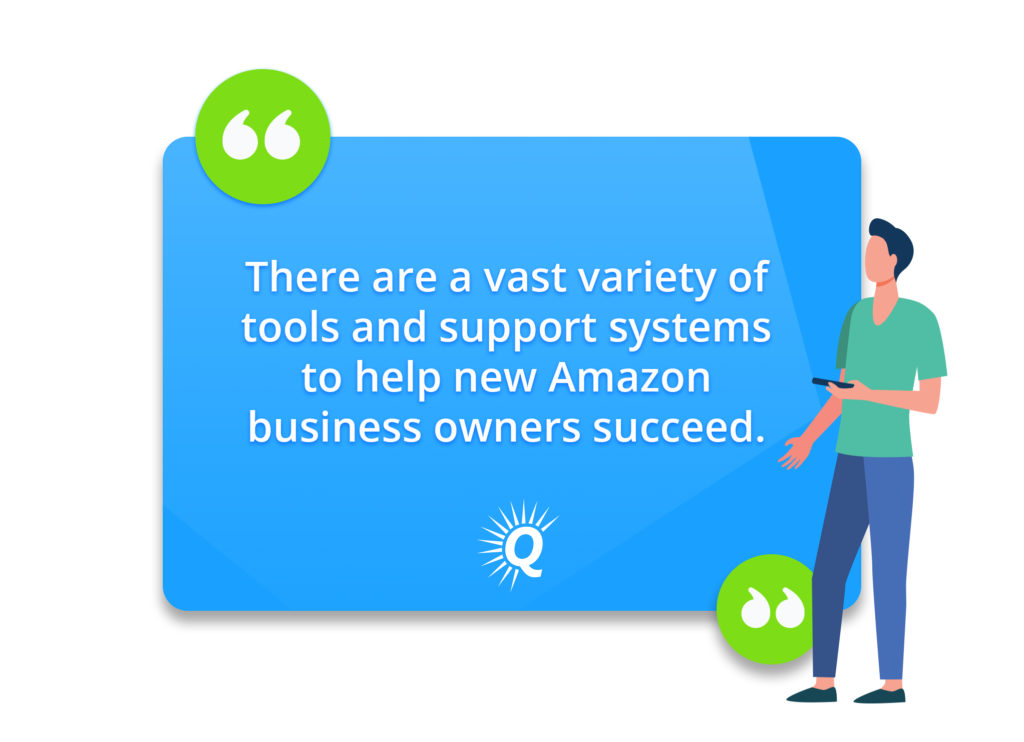

For owners who want to have an active role in managing their Amazon business, there are numerous guides and tools that empower sellers with all the necessary resources they need to succeed with a newly acquired Amazon business.
For owners that want to turn over the management responsibilities to someone else, it’s not difficult to find an agency that is familiar with running and growing Amazon businesses in exchange for a commission or fee. Whether you want to be heavily involved or simply set a four year plan and then let someone else do most of the work, there are a variety of ownership models to choose from.
Need Help Managing Your Amazon Store?
Visit Our Partner Page to View a List of Experienced Partners We’ve Worked with Over the Years.
Cons of Investing in Amazon Businesses
While there are significant advantages to investing in Amazon businesses, there are also some common objections that potential buyers have when approaching the marketplace. Some of these include:
- Lack of personal customer relationships.
- Lack of brand identity.
- Channel risk.
- Competition within the marketplace.
- Threats from other platforms.
- If you’re not growing, you’re dying
- Cost of FBA
One of the most common complaints about selling on Amazon is the lack of directness in the relationship that brands have with their customers.
Amazon businesses don’t ‘own’ their customers
Although Amazon provides an immense quantity of traffic for Amazon businesses, they also maintain close control over the relationships between customers and sellers.
On Amazon, sellers can communicate with customers via Seller Central, but it’s pretty difficult for Amazon businesses to carry the relationship forward beyond that point. Unlike with Shopify stores, Amazon sellers aren’t able to access customers’ personal information such as email addresses, mailing addresses, or phone numbers.


This is due to Amazon’s customer privacy policies, but it’s also a way for the company to ensure that customers are loyal to them instead of individual Amazon sellers. This leads to another ‘con’ for Amazon businesses…
The difficulty of building a brand on Amazon
It’s relatively straightforward to build a business on Amazon but much more difficult to build your own brand.
One of the qualities that make Amazon so user friendly for sellers is the simplicity and standardization of the entire selling process. Every product page has a title, bullet points, product description, and sometimes A+ content that are all formatted exactly the same from product to product. After a product is added to a shopping cart, the check out process and confirmation page are both controlled entirely by Amazon.
While this removes a lot of headache and decision fatigue among sellers, it also eliminates significant opportunities for distinction and brand building. Therefore, many Amazon businesses never develop a unique brand identity among their customers, even once they’ve reached the point at which they’re doing millions of dollars per year in revenue.
Channel risk
Another common question comes up for would-be buyers of Amazon businesses: what if Amazon decides to shut down the seller account and totally ruins the business?
Everyone’s heard of horror stories in which an Amazon account was “randomly” closed for no apparent reason. No one can ever completely predict what Amazon will do, but it’s pretty clear that most account closures aren’t random.
Amazon depends on sellers for its continued growth and success, so it isn’t in Amazon’s interests to shut down businesses that are playing by the rules and providing high-quality products to its customers. However, the company also has an obligation to protect consumers from unethical practices, counterfeiters, and those who undermine the platform’s standards.


If you run a business that generates fake reviews and produces a high rate of defective products, it’s certainly possible that Amazon will find out and shut down your seller account. Therefore, it’s essential that sellers build and grow their businesses in compliance with Amazon’s Terms of Service (TOS).
Although multi-channel eCommerce businesses can sometimes sell for a slightly higher multiple, the difference isn’t too significant due to the numerous other advantages of Amazon businesses that have a healthy profit margin. The following video goes into more detail about the platform risks associated with running an Amazon business.
The Amazon platform is very competitive
Amazon’s appeal means one thing: there are tons of sellers competing for customers on the platform.
For new sellers, the growth in competition has led to a dramatically increased startup cost in most cases. While a modest budget can still go a long way with the right strategies, it’s essential to allocate capital for every Amazon fee, storage fee, and advertising expense that a product launch entails.
For those acquiring Amazon businesses, the existing competition in the marketplace is a two-edged sword. On the one hand, it presents the need to fend off other sellers to maintain market share. On the other, it provides barriers to entry for new sellers, leading to a more stable market environment.
What if another platform overtakes Amazon?
With Walmart and other platforms investing heavily in their eCommerce infrastructure, some business owners wonder if Amazon businesses could come under pressure in the coming years.
There’s no doubt that other players are contributing to the rapid growth in eCommerce, but Amazon’s market share is continuing to grow year-over-year. Even if other platforms evolve in unexpectedly impressive ways, there’s little doubt that Amazon will continue to occupy a significant role in the market, making it a great place for sellers to do business.
Whether you’re an existing seller seeking to exit Amazon or are an investor searching to acquire an existing business, the Amazon business marketplace is ripe with opportunity.
Metrics Used to Evaluate Amazon Businesses
Choosing the right Amazon business to buy requires knowing what metrics to look at in your evaluation process. By carefully analyzing the numbers that matter the most for Amazon seller success, you’ll be in a much better position to acquire a desirable FBA business.
Some of the more important Amazon business metrics to evaluate include:
- Product Rankings
- Reviews
- Seller Rating
- Order Defect Rate
- Inventory Performance
- Invoice Defect Rate (IDR)
- Conversion Rate
- Fulfillment Performance
Product Rankings
An Amazon product’s ranking reflects how well it performs relative to other products in the same category. Within Amazon, this number is referred to as Best Seller Rank (BSR).
For example, if a kitchen knife has a #5 BSR, then that means it sells the fifth most units in its respective category, which most likely would be Kitchen and Dining. Of course, a low BSR means that the product is more successful, and therefore more desirable to own as an Amazon seller.
If an Amazon business has many products with a low BSR, it reflects very positively on the way in which the business is being run. By consistently demonstrating leadership in their given market, it’s clear that the business is delivering high-quality products, running an efficient supply chain, and effective in its marketing efforts. All of these lead to a business being more valuable.


Since each product category experiences a different sales volume, it’s impossible to determine what a “good” BSR is of a specific product without evaluating the category as a whole. A BSR of #50 in one category might be equivalent to one of #500 in another.
It’s important to note that BSR is based on the number of units sold and not overall revenue. For example, a product with a BSE of #5,000 might generate more revenue than one that is ranked #500 if it sells at a significantly higher price point.
Reviews
Everyone knows that reviews are an essential part of a seller’s success. There are two main review metrics that investors should look at:
- The total number of reviews for each product.
- Review rating for each product.
Having a high number of reviews relative to competing products can pose a formidable barrier against competition. All else being equal, if a product has 10,000 reviews when the average competitor only has 500, it will make that product highly desirable to own. If a seller has ten products that all have an exceptionally high review quantity, then the Amazon business as a whole is likely quite desirable to acquire.
The second important aspect of reviews is the star rating. Of course, a higher star rating means that a product is more desirable and valuable to own. When a high star rating is combined with a high review quantity, then the business is likely a winner.
Seller Rating
An Amazon business’s seller rating is one of the vital metrics that reflects the overall health and success of a seller account. It is measured on a scale from 1-100 and takes into account several key factors including:
- Customer inquiries
- Cancelations
- Shipping time
- Reviews
A high rate of customer inquiries reflects that customers may have confusion or concerns about a seller’s products. Therefore, this can lower the overall Seller Rating.
Similarly, cancellations aren’t a good sign either. Amazon businesses should also seek to represent their products accurately in order to not provide false expectations leading to cancellations or returns.
No one likes it when their orders arrive late, and Amazon will penalize sellers whose products exceed their timelines for shipping standards. For sellers who use Fulfillment by Amazon (FBA) to fulfill orders, this isn’t usually a significant factor since they’re not shipping orders themselves. Reviews further contribute to a business’s Seller Rating
Order Defect Rate
One of the things people love about Amazon is the reliability they provide in all aspects of their business, including product consistency.
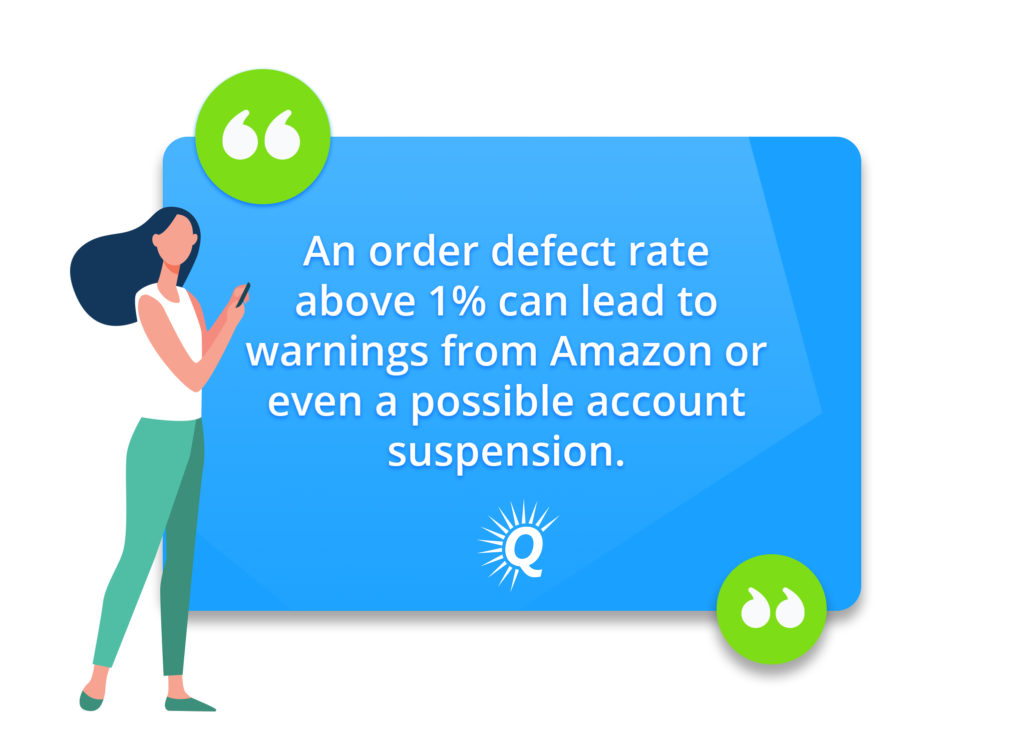

Sellers who have a high defect rate won’t just suffer from negative reviews, they could face severe consequences from Amazon. Therefore, it’s wise to investigate a business’s order defect rate before purchasing a business.
An order defect rate above 1% can lead to warnings from Amazon or even a possible account suspension. For existing sellers, if your defect rate is at all concerning it’s probably a good idea to have some difficult discussions with your suppliers or implement a more effective Quality Control (QC) process.
Inventory Performance Index (IPI)
Inventory Performance Index is another Key Performance Indicator (KPI) that is important to look at. This number ranges from 0-1000 and is a measure of how efficiently an Amazon business manages on-hand inventory.
If a business holds excess inventory in FBA, its IPI will be reduced. However, if their inventory levels match an acceptable standard based on their sales volume, their IPI will increase.
In general, Amazon businesses should seek to maintain an IPI of more than 500. A low IPI can lead to Amazon imposing more strict inventory storage limits for the seller account.
Invoice Defect Rate (IDR)
The Invoice Defect Rate is the rate at which an Amazon seller fails to provide an invoice to Amazon business customers within one day or order shipment.
This metric doesn’t apply to Amazon businesses that don’t sell to Amazon business customers. However, if a business does, this is an important process to get right in order to maintain a high level of customer satisfaction and customer lifetime value.
An IDR of below 5% is considered acceptable.
Conversion Rate
The conversion rate of any eCommerce business is an important metric to evaluate, and Amazon businesses are no different.
Amazon refers to the conversion rate as the Unit Session Percentage Rate. On Amazon, the average conversion rate is just north of 12%. While Amazon sellers don’t need to worry about many of the funnel optimization aspects of some other online business, they do need to provide high-quality product pages in order to succeed.
In some cases, a low conversion can represent an opportunity for new owners. If a product has low-quality photos or descriptions but is performing relatively well with high customer satisfaction and many positive reviews, the product page probably has room for improvement. Adding new images, a revised description, or A+ content can give many products a quick boost in their conversion rate and overall success.
Fulfillment Performance
Fulfillment performance reflects several of the fulfillment measurements combined. These include the order defect rate, cancelation rate, and late shipment rate.
Amazon businesses should aim for rates below the following KPIs:
- 2.5% pre-fulfillment cancellation rate.
- 4% late shipment rate.
- 1% order defect rate.
In general, meeting these KPIs reflects a sound supply chain and logistics management. Sellers who have issues in any of these areas might be wise to improve before going to market. On the other hand, buyers who investigate such a business might be able to find opportunities for immediate improvement under their post-acquisition management.
Factors to Consider When Investing in an Amazon Business
Like any potential acquisition, it’s essential to look carefully at critical factors within the business to determine whether or not it’s a good deal.
At Quiet Light, there are four critical areas we look at in the valuation process. Smart investors examine these areas as well when making purchase decisions:
- Growth
- Risk
- Transferability
- Documentation
We call these the Four Pillars of Value. Here’s how you can examine an Amazon business based on these Four Pillars.
Growth
Almost universally, an online business is worth more if its year-over-year earnings are trending upward.
Understanding an Amazon business’s revenue and profit growth trajectory is often as simple as looking at the last few years of Profit and Loss Statements (P&Ls). Because growing businesses are highly desirable, you can expect to pay a higher price for one.
If a business is in decline, it’s important to examine why that is the case. Perhaps, there is a simple explanation that doesn’t indicate a deeper issue or challenge. For example, if an FBA business recently experienced a temporary supply chain disruption that significantly reduced its sales, that may not be as concerning as an issue that is expected to linger or worsen.
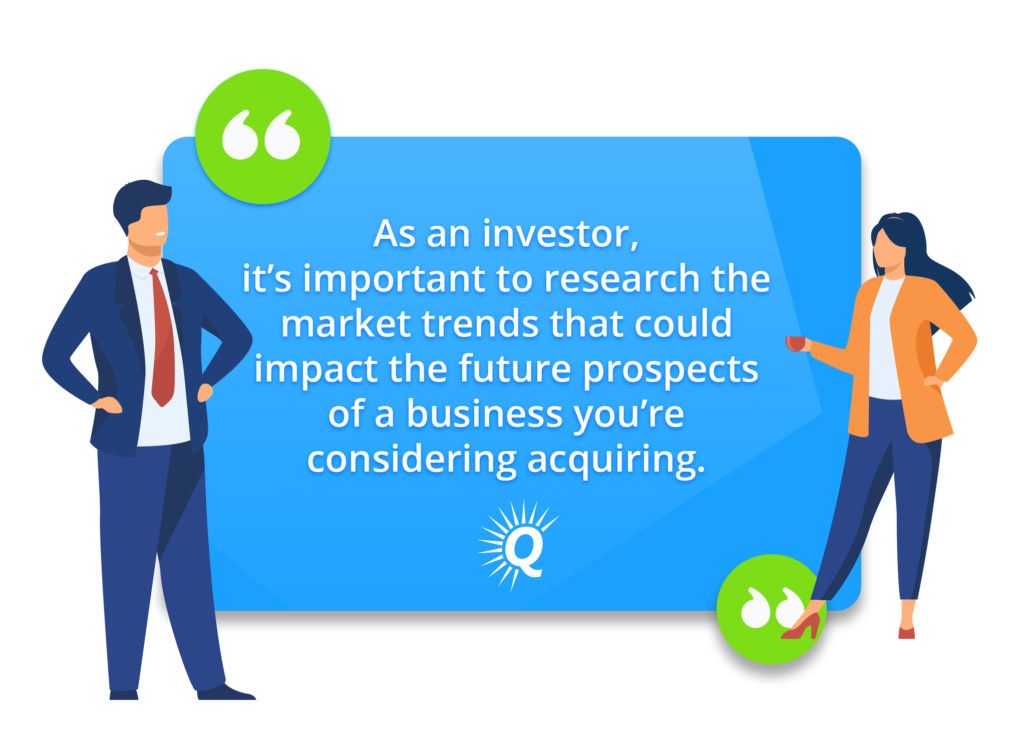

If, on the other hand, market demand for a business’s product line is declining, that could be a warning sign. As an investor, it’s important to research the market trends that could impact the future prospects of a business you’re considering acquiring.
Conversely, if a business is operating in a quickly growing market that is expected to continue on the same trajectory, that could potentially be a gold mine investment opportunity.
Risk
A quickly growing business is great, but what is the likelihood that it will continue on such a promising path after it’s yours? In addition to examining a business’s prospects for growth, it’s essential to consider what risks it might be exposed to.
For Amazon businesses, a few common sources of risks include:
- Competition
- Product line stability
- Supply chain risk
The competitive landscape can dramatically affect the prospects for an Amazon FBA business to succeed.
If an FBA business operates in a market in which new sellers are quickly emerging, that could potentially threaten the long-term viability of the business in question. Even if the business is able to remain competitive, it’s likely that the influx of sellers will reduce prices and in turn, profits.
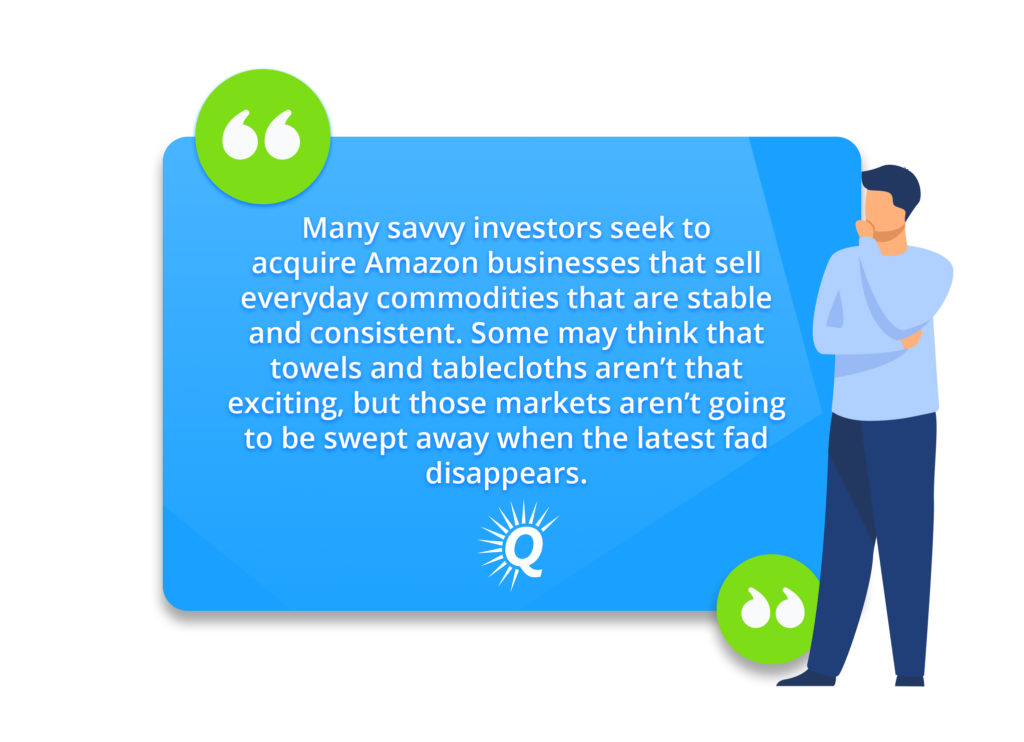

Unstable product lines present another risk. If an Amazon business is selling products that are popular now but might go out of fashion next year, that could be concerning from an investment standpoint.
Many savvy investors seek to acquire Amazon businesses that sell everyday commodities that are stable and consistent. Some may think that towels and tablecloths aren’t that exciting, but those markets aren’t going to be swept away when the latest fad disappears.
Supply chains can introduce further risks that can cause an Amazon business to be less stable. If the business’s products require rare components with drastically variable pricing, that could create future issues if a sudden change in cost negatively affects profitability.
Transferability
Most Amazon businesses can be transferred to a new owner, but some are certainly more transferable than others.
If a business is being run solely by the owner, has many complex parts, and has no Standard Operating Procedures (SOPs), a new owner is going to have a difficult time jumping in and managing the business.
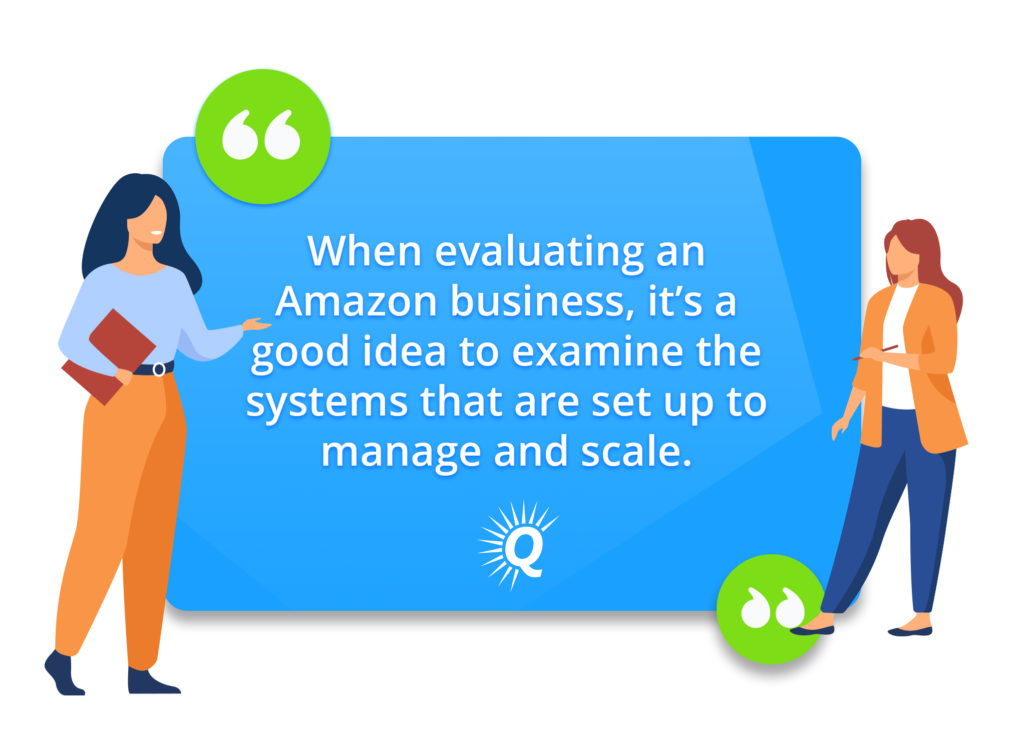

When evaluating an Amazon business, it’s a good idea to examine the systems that are set up to manage and scale. If the seller is highly organized, has clear SOPs, and a dedicated team overseeing most of the business’s operation such as ordering inventory and creating product listings, there’s going to be a lot less headache involved during the transition process for most buyers.
Documentation
Lastly, it’s important to have a clear and accurate understanding of the business you’re acquiring, and that is only possible if all important information is well documented.
If a seller isn’t able to provide well-composed financial statements that can be verified, it might be wise to reconsider an acquisition opportunity. In addition to showing the overall financial performance of the business, effective documentation can reveal insights and opportunities that could otherwise be overlooked.
Documentation also reflects another, crucial aspect of a business’s disposition. It shows that the previous owner has been thoughtful, diligent, and meticulous in how they’ve been managing their prized asset. If their books and SOPs are in order, then there’s a pretty good chance that most of the other details have also been thoughtfully managed and considered in their Amazon Seller Business.
Who Is Buying Amazon Businesses?
The benefits of owning an Amazon business attracts buyers of all backgrounds and levels of experience. From individuals to large private equity funds, there’s significant interest within just about every segment of the buyer pool.
For individuals, acquiring an Amazon business is seen as a promising path to generating a high ROI within a proven business model framework. You don’t need to have decades’ worth of industry experience to learn how to step in and take over a successful FBA business. With some moderate technical skills and a sharp sense of business, many new owners are able to acquire and grow.
Many of these individual buyers are career executives who have been successful in the corporate environment and want to transition to work that is more flexible and allows greater freedom.
Thinking of Selling Your Business?
Get a free, individually-tailored valuation and business-readiness assessment. Sell when you're ready. Not a minute before.
Some individual buyers are interested in being heavily involved in the day-to-day operations of the business and want to take a significant role in its growth. Others prefer to have a more passive role and are primarily interested in the potential for passive income. For the latter kind of buyer, it’s typically smart to acquire a business that is already highly systematized and easy to manage.
Then, there are buyers who are extremely experienced and are seeking to roll up many different Amazon businesses within one comprehensive business infrastructure. These buyers are often seeking to buy larger businesses than most individual buyers. They typically have very specific criteria they use to evaluate investment opportunities and choose businesses to buy.
Thrasio is one such company that specializes in purchasing and growing successful Amazon businesses. Once they acquire an FBA business, they apply their own infrastructure to accelerate its growth. Often, they’re able to quickly improve the businesses they buy due to their highly developed systems for optimization.
Companies such as Thrasio don’t require training or hand-holding through the transition process. According to the company, their average deal is completed in just forty-three days, making it easy for sellers to feel confident that everything will go smoothly.
Perch is another company that focuses on acquiring and scaling existing Amazon businesses. Like Thrasio, they’re highly capitalized and are composed of teams of specialists who excel at what they do.
As a seller, there are both pros and cons of selling directly to these companies. Therefore, it’s important to evaluate each option carefully to make the best decision for yourself.
Because these companies manage so many different Amazon businesses, they’re able to benefit from “economies of knowledge.” Instead of having one or a few people doing every activity, they’re able to invest in creating highly optimized systems to satisfy every requirement of running an Amazon business.
About the author: Ian Drogin is an entrepreneur and writer with a passion for helping business owners succeed. He has built and sold an FBA business, written numerous top-ranking business articles, and held multiple roles within marketing and sales.
As Quiet Light’s Content Director, Ian is intently focused on providing the most useful, up-to-date information available about buying, building, and selling online businesses. When he’s not working, Ian enjoys surfing, sailing, backpacking, and traveling.





